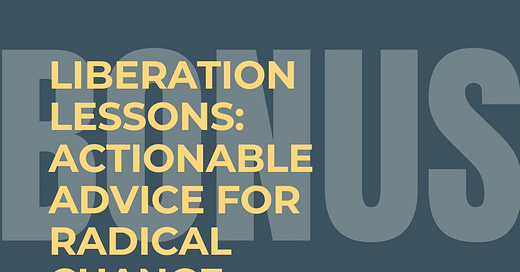How Do I Embrace the Parts of Myself I've Been Taught to Hide?
Liberation Lessons: Actionable Advice for Radical Change A Weekly Paid Subscriber Bonus
Dear Liberators,
For so many of us, the messages we receive from society, family, and systems of oppression teach us to suppress parts of ourselves that don’t conform to expectations. We are taught to hide vulnerability, downplay joy, mute anger, and silence authenticity. This suppression is a survival mechanism within oppressive systems—but it comes at a cost. The parts of ourselves we’ve been taught to hide don’t disappear; they become our shadows, quietly influencing how we see ourselves and interact with the world.
You may ask, Why should I embrace the parts of myself I’ve been told to suppress? Because these parts are integral to your wholeness. Embracing your fullness disrupts the narratives that oppression relies on, creating space for liberation—not just for yourself, but for those around you. Reclaiming these hidden parts is an act of resistance and a declaration of your humanity.
We are becoming more familiar with terms like masking and unmasking, particularly for neurodiverse identities, where these behaviors fall under ableism. Yet, masking exists across many systems of oppression. Consider how:
People experiencing poverty mask their struggles by trying to appear affluent to access opportunities or avoid judgment.
Those in marginalized communities suppress aspects of their identity to conform to the expectations of white-dominant spaces.
Women hide ambition or assertiveness to avoid being labeled as “difficult” or “unlikeable.”
Men suppress vulnerability and tenderness to meet patriarchal ideals of strength.
Masking is a survival strategy, yet it reinforces the systems that demand conformity. For Black bodies, there is no true escape from supremacy culture. Unlike others who might mask aspects of themselves to assimilate, Black people are not offered the option to fully integrate into systems of power that inherently dehumanize them. The demand for conformity becomes another tool of oppression.
Consider how supremacy culture shapes what we are allowed to express:




